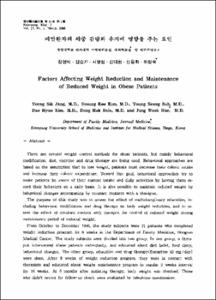비만환자의 체중 감량과 유지에 영향을 주는 요인
- Alternative Author(s)
- Suh, Young Sung; Kim, Dae Hyun; Shin, Dong Hak; Hur, Jung Wook
- Journal Title
- Keimyung Medical Journal
- Issued Date
- 1998
- Abstract
- There are several weight control methods for obese patients, but mainly behavioral modification, diet, exercise and drug therapy are being used. Behavioral approaches are based on the assumption that to lose weight, patients must decrease their caloric intake and increase their caloric expenditure. Toward this goal, behavioral approaches try to make patients be aware of their current intake and daily activities by having them record their behaviors on a daily basis. It is also possible to maintain reduced weight by behavioral changes accompaning by constant contacts with a therapist.
The purpose of his study was to assess the effect of multidisciplinary education, including behavioral modification and drug therapy on body weight reduction, and to assess the effect of constant contact with therapist for control of reduced weight during maintenance period of reduced weight.
From October to December 1996, the study subjects were 21 patients who completed weight reduction program for 8 weeks in the Department of Family Medicine, Dongsan Medical Center. The study subjects were divided into two group. In one group, a therapist interviewed obese patients individually, and educated about diet habit, food diary, behavioral changes. The other group, education and drug therapy(fluoxetine 40 mg/day) were done. After 8 weeks of weight reduction program, they were in contact with therapists and educated about weight maintenance program in regular 2 weeks interval for 16 weeks. At 6 months after initiating therapy, body weight was checked. Those who didn't revisit for follow-up check were evaluated by telephone questionnaires.
After weight reduction program for 8 weeks, the mean weight change was -2.2±1.09kg in education group, -2.9±1.88kg in combined education and drug therapy group. There were no significant differences. During maintenance program of reduced weight, weight changes according to the frequency of visit for contact with therapist were significant difference(p<0.05). In the change of BMI(Body Mass Index), there were also significant differences in each visit group, In the weight reduction program, the important factor affecting weight reduction was activity, and in weight maintenance program, was constant contact with therapist and patient's age. During 6 months(including weight reduction and maintenance program), a change of weight in completed contact group with therapist is larger than not completed contact group with therapist.
- Alternative Title
- Factors Affecting Weight
Reduction and Maintenance of Reduced Weight in Obese Patients
- Department
- Dept. of Family Medicine (가정의학)
Dept. of Internal Medicine (내과학)
Institute for Medical Science (의과학 연구소)
- Publisher
- Keimyung University School of Medicine
- Citation
- 장영식 et al. (1998). 비만환자의 체중 감량과 유지에 영향을 주는 요인. Keimyung Medical Journal, 17(1), 100–110.
- Type
- Article
- 파일 목록
-
-
Download
 17-100.pdf
기타 데이터 / 570.44 kB / Adobe PDF
17-100.pdf
기타 데이터 / 570.44 kB / Adobe PDF
-
Items in Repository are protected by copyright, with all rights reserved, unless otherwise indicated.